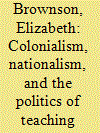| Srl | Item |
| 1 |
ID:
132970


|
|
|
|
|
| Publication |
2014.
|
| Summary/Abstract |
For Palestinian nationalists in Mandate Palestine, British education policy was a source of constant frustration. The shortage of schools, the lack of local control over the curriculum, and the marginalization and de-politicization of Palestinian history constituted major grievances. Proceedings from the Peel Commission reveal much about the rationale behind this policy, particularly the bias toward "rural" education and the attempts to control teachers. Drawing on and complementing the work of A.L. Tibawi, this article seeks to shed light on the nationalists' protests by examining both the responses of officials brought before the Commission, as well as the government's history curriculum during the Mandate. In doing so, the research shows that education policy was constructed to maintain the underdevelopment of Palestine and to hinder state-building efforts that could compete with those of the Zionists.
|
|
|
|
|
|
|
|
|
|
|
|
|
|
|
|
| 2 |
ID:
154281


|
|
|
|
|
| Summary/Abstract |
Using the 1929 Midwives Ordinance as an analytical lens, this article argues that the Mandate government’s treatment of Palestinian midwives reflected Britain’s broader aims to control colonial subjects and to institutionalize health care, perpetuating British constructs of gender and class in the process. It claims that in restricting midwives’ autonomy, the administration not only infringed on their livelihoods but curtailed Palestinian women’s economic opportunities. While Palestinian midwives successfully used a number of creative tactics to resist government attempts to control them, the restrictions placed on them limited general access to health care, especially in rural areas of Palestine. In an era of unprecedented state reach, however, officials were far more concerned with monitoring midwives than with expanding Palestinians’ access to much-needed health care, ultimately privileging the Yishuv in this sphere, as in so many others.
|
|
|
|
|
|
|
|
|
|
|
|
|
|
|
|